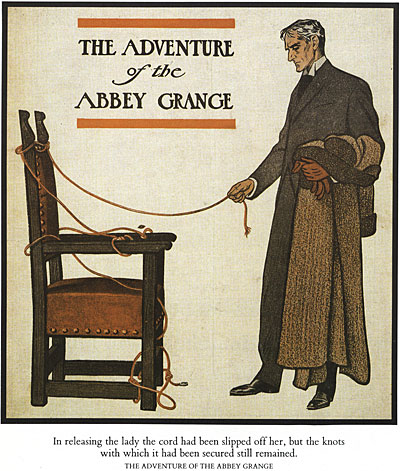

Personally, I find the " protect someone from scandal" excuse fairly flimsy. I have learned caution now, and I had rather play tricks with the law of England than with my own conscience." Perhaps Sir Arthur Conan Doyle should have shown us one of those stories, where Holmes turning in the crook did "more harm than the criminal deserved." As a reader, I'd like to see something concrete to justify Holmes' decision to use his " right of private judgement" so often. Holmes tells Watson that " Once or twice in my career I feel that I have done more real harm by my discovery of the criminal than ever he had done by his crime. Whether it is because he feels the criminal has been punished harshly enough, or in order to best protect his client, Holmes has shown little compunction about covering up the truth, and allowing criminals to go. So, there have been plenty of times when Holmes has substituted his own judgement for that of the official legal system. He lied to the police about his knowledge of the murder of Charles Augustus Milverton, because the blackmailer had it coming (and to turn in the mysterious lady would have incriminated he and Watson for burglary!). In The Priory School, Sherlock was persuaded by a very wealthy man to allow the villain to get away ("no, really, he's leaving the country and will reform!!"). In The Naval Treaty, Holmes allowed Joseph to flee, in order to get the papers back, although he did wire Scotland Yard about him-but not until the next morning. In Copper Beeches, Holmes did not turn in Rucastle for kidnapping-perhaps because his victim had escaped and eloped, perhaps because the detective thought getting mauled by a dog was punishment enough. In Beryl Coronet, Holmes allowed a blackguard to flee in order to protect his client-as well as one of England's " highest, noblest, most exalted names"-from scandal. In The Blue Carbuncle, Holmes hadn't been hired by the police, and chose to show holiday-inspired mercy to an inept thief who seemed unlikely to break the law again. In The Boscombe Valley Mystery, the murderer was dying, and Holmes made sure that he left a signed confession so no innocent party would be convicted. In A Case of Identity, there was no crime committed, and Holmes also decided that it would be far too icky to tell his client that she was wooed by her own stepfather. We have seen thus far many stories where Holmes does not turn in the perpetrator. As it turns out, Abbey Grange is also the story that makes us ask whether or not Sherlock Holmes is treating justice too much like a game.


 0 kommentar(er)
0 kommentar(er)
